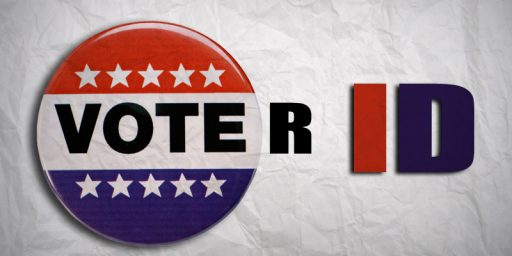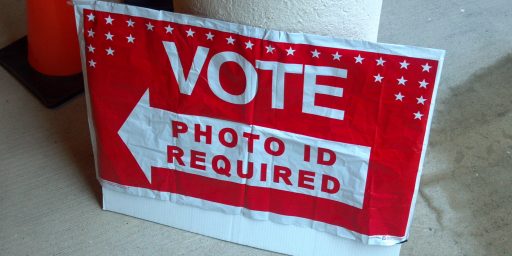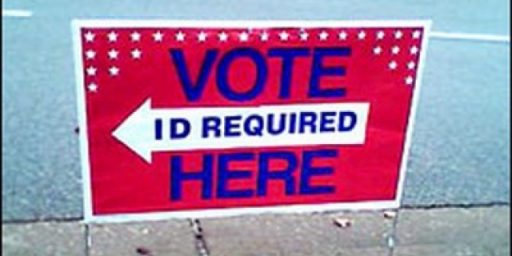Voter ID Requirement Lowers Turnout
The NYT reports on a new study that shows a decline in voter turnout in states with even modest voter identification requirements.
States that imposed identification requirements on voters reduced turnout at the polls in the 2004 presidential election by about 3 percent, and by two to three times as much for minorities, new research suggests.
The study, prepared by scholars at Rutgers and Ohio State Universities for the federal Election Assistance Commission, supports concerns among voting-rights advocates that blacks and Hispanics could be disproportionately affected by ID requirements. But federal officials say more research is needed to draw firmer conclusions about the effects on future elections.
Tim Vercellotti, a professor at the Eagleton Institute of Politics at Rutgers University who helped conduct the study, said that in the states where voters were required to sign their names or present identifying documents like utility bills, blacks were 5.7 percent less likely to vote than in states where voters simply had to say their names. Dr. Vercellotti said Hispanics appeared to be 10 percent less likely to vote under those requirements, while the combined rate for people of all races was 2.7 percent.
[…]
Only two states, Indiana and Florida, now require all voters to show photo ID, and voters without it are allowed to cast only provisional ballots. Indiana officials have said voter turnout increased by 2 percent last November, compared with the 2002 midterm election, despite the enactment of a photo ID law in 2005. Three states — Hawaii, Louisiana and South Dakota — require voters without photo ID to sign affidavits to cast regular ballots. Photo ID laws in Missouri and Georgia have been struck down in court, and several states are considering similar measures.
Americans have to have identification to drive, fly on airplanes, buy cigarettes or alcohol, or even see movies that use the F-word. Surely, it’s not unreasonable to require people prove they are eligible to vote.
Further, the study doesn’t seem to address a rather obvious question: What has been the impact on voter fraud? How much of the 2.7 percent reduction consists of people who weren’t eligible to vote in the previous election but did anyway?





James, I don’t see a link to the source here. Are you the author?
Link added. Just a coding error on my part. -ed.
Please do put up the link.
However, I have to agree that there is something very odd about the reluctance to require ordinary identification to vote.
I am astonished that Hispanics are 10% less likely to vote when identification is required. I might be tempted to attribute this to the illegal immigrant factor, but the claim that blacks (who are overwhelmingly not immigrants, legal or otherwise) are 5.7% less likely to vote suggests otherwise.
I don’t have a good explanation. Some bad explanations come to mind (greater apathy among minorities; greater paranoia among minorities; more illegal voting among minorities) but none really makes sense.
I suppose I can understand some reluctance to require identification when we don’t understand why it seems to affect minorities more. I don’t share that reluctance, but at least I can understand it.
My own view is that the reasons for requiring identification to vote are eminently reasonable, and should not be held hostage to what strikes me as unreasonable behavior on the part of minorities. However, I want to understand that unreasonable behavior better. This study could be the first step towards such understanding — but I rather fear that, having scored their political points, the authors will not bother with the followup study that would be genuinely enlightening.
Or the other obvious question about how much voter fraud is attributable to absentee balloting which is much harder to verify and many think is a much bigger problem.
Wholesale vote fraud (on the part of local election commissions) is a lot easier and more profitable than retail vote fraud (on the part of individual voters).
If having to sign your name (vs having it spoken) reduces black voter participation by 5.7%, then the issue is not availability of ID. The most logical explanations for the 5.7% are 1) they illiterate to the point of not be able to sign their own name, 2) they were committing voter fraud and the additional identification dissuaded them, and/or 3) there was normal fluctuation in voter participation.
Indiana, admittedly not a fount of minorities, sees increased voter participation with a much stricter law.
There was a time in this country that blacks literally may have been putting their life on the line to vote. Thankfully those days are behind us. Is signing your name really such a deterrent given what has been overcome?
One should just point out that this is a feature, not a bug. Reducing minority turnout has been a mainstay of the Republican strategy.
My experience has been that black voters are very sensitive on this issue (for good reason) and seem to experience being asked for ID differently than I might. Just because you’re under the same conditions and obligations doesn’t mean you’ll have the same experience.
Unlike, say, reducing enlisted turnout. But hey, I guess we will all progress towards a better world by always questioning motives first and refusing to address any legitimate questions raised by political opponents.
Are we REALLY going to suggest that a somewhat lower turnout is a bad thing, given the very purpose of such requirements is to disallow voting by people who have no righth to it, including illegals?
Rick, you bring up the elephant in the living room. Requiring voter ID at the polls is a good idea. Cracking down on absentee voting is a great idea, solely because of the potential for fraud.
I for one have no problem with making voting somewhat of a nuisance, so long as the nuisance is colorblind and ideologically neutral. Filtering out the votes of those who can’t be bothered strikes me as a good thing.
Since there haven’t been poll taxes in 40 years exactly what is the good reason?
History, for one thing. It can make one overly-sensitive. Harrassment continued long after poll taxes were illegal for another.
Finally, “raised consciousness”. That tends to make one interpret everything in terms of whatever one’s consciousness has been raised with respect to.
Sensitivity extends long beyond the actual events. The Holocaust took place more than 60 years ago and Jews are still sensitive about it, aren’t they? The Armenian genocide took place nearly a century ago and it remains a factor in the Armenians’ dealings with the Turks.
Dave Schuler,
I think you comments on minority sensitivity is a case of soft bigotry. Are you suggesting that blacks lack the backbone to weather the gauntlet of a voter ID today, but that they marched and overcame much worse 40 years ago? So to protect their fragile egos we should ignore the issue of voter fraud and not require even less ID than I need to get my car inspected?
Living in Florida–which along with Indiana requires photo ID in order to vote–I’m not particularly sensitive to complaints about voter ID. My precinct includes a portion of the “Black area” of Sarasota. The majority of voters there last election day were, in fact, Black. They were all capable of providing ID and did so as part of the requirements to their voting.
The voter ID legislation I’ve seen kicked around are all colorblind. That one’s perception of ID checks may vary due to one’s group’s history is not, in my view, adequate cause to turn away an act that serves to protect the integrity of my vote.
While absentee voting can surely be gamed, I don’t see it as a major problem. The absentee ballots I’ve used while living overseas have all required that a second party witness my signature on my ballot. Sure, that second signature could be fake, but that bring in another legal violation which, because these ballots are mail, makes it a federal offense. You can always decide to break the law, though.
Maybe the states could do a better job of verifying absentee ballots, even just a spot-check. That would help, IMO.
Yuhuh
Asked for a drivers license… rounded up and sent to death camps and starved to death and dumped in deathpits – same dif.
I’m sorry, but the unintended irony of that sentence is too much to pass up.
If that is infact the only reason for the lower turnout, then the program is a success. However, the general consensus seems to be that the drop in turnout is higher than can be explained by stoping fraud, meaning legitimate voters are not voting, which is an issue. Not everybody has or needs a photo id, we could say you need a credit card to prove you are over 18 (some companies do this), but not everyone has or needs a credit card.
Voting is a birthright of every citizen.
It seems to me that once someone is registered to vote, and their name and address is listed on the voter roll in their neighborhood precinct, asking for identification is somewhat of an insult. Do you think they are going to try to impersonate someone else, a neighbor, who may have already voted?
Demanding identification at the polling place does nothing to stop voter fraud, if that is what you are truly worried about. The time to stop it would be at the time of registration, not at the time of voting.
An id check tells you nothing about whether or not the person is a citizen.
It seems to me that once someone is registered to vote, and their name and address is listed on the voter roll in their neighborhood precinct, asking for identification is somewhat of an insult.
I suggest you have a thin skin.
The voter registration lists that are given to poll workers exist to determine who is eligible to vote, or if you prefer, to indicate who is a citizen living in a given voting district. That is not a decision poll workers are asked to make, nor should they be. Getting your name on that list generally requires that you show some identification to the appropriate authorities that indicates you are a citizen well in advance of an election, so there is time to validate said identification and properly generate the voter lists to be provided to the poll workers.
The decision poll workers should be asked to make is whether or not you really are the person you claim to be on the list provided to them. To claim that this doesn’t help control fraud is just silly and indicative of a either an absence of knowledge about elections in this country or a desire to be intentionally duplicitous.
Please note that I didn’t say eliminate fraud, because that is a much more complex problem and certainly beyond the scope of poll workers.
Surely, it’s not unreasonable to require people prove they are eligible to vote.
James, correct me if I’m wrong, but isn’t this what registering to vote is for?
It seems to me that once someone is registered to vote, and their name and address is listed on the voter roll in their neighborhood precinct, asking for identification is somewhat of an insult. Do you think they are going to try to impersonate someone else, a neighbor, who may have already voted?
and
James, correct me if I’m wrong, but isn’t this what registering to vote is for?
By that logic, once someone has passed a driving test, they should not have to carry a license around with them to prove that they’re eligible to drive.
Officer: Let me see your license.
Joe Smith: I find that very intimidating. Take my word for it, I passed my test.
Officer: Umm, but how do I know that.
JS: I just told you!
Officer: Right you are! Sorry to have troubled you! Be on your way then!
Funny I’ve never presented an ID to see a movie….
James,
Driving a car is a privilege, voting is a birthright.
Your analogy is revealing of how conservatives think: you would require testing in order to limit the franchise to those who met your ‘standards’, and those you ‘approved’ of.
You are a southern conservative, right? How typically characteristic of you to think like that.
So here is how you think the fraud works?
A guy goes to your neighborhood polling place and tells the poll worker that his name is charles austin and gives your address as his residence.
Is that really what you are worried about?
I think you guys are nuts.
charles, I meant to add that in all of the elections since Kennedy I have never once heard of a case where something like this happened.
Your analogy is revealing of how conservatives think: you would require testing in order to limit the franchise to those who met your ’standards’, and those you ‘approved’ of.
Yeah, those registered to vote in a precinct. I don’t know how the poll worker knows who that is absent identification. It just isn’t that hard to produce an ID card.
Ken, I grew up in the Chicago suburbs, and have subsequently lived throughout the country, settling in St. Louis. I mention this only because I have read about vote fraud in real time, predominantly in Democratic strongholds mind you, most of my life. You seem remarkably oblivious to the fact that vote fraud is a real and serious problem. I’d provide links, but what’s the point?
And why producing an ID card constitutes disenfrachisement when ID cards are available at no cost is beyond my ability to understand. Just saying it over and over doesn’t make it so. I am sensitive to past injustices, but to so glibly imagine that my only motive is to suppress turnout is offensive and silly.
Ken; Your comment is revealing of how you liberals think! Mail in your vote, visit every precinct and vote, even if you’re not a citizen…VOTE! He who votes the most,WINS!! Obviously you believe that those who can’t find the registrar, or identify themselves, make the best democrats
Dave Schuler said:
This is ridiculous! There are black poll workers in districts. It’s not like there’s only white people working the polls and there’s some racial issue involved.
Ken said:
This isn’t 1950 where everyone knows their neighbors and you’ll be insulting little Johnny or old lady Margaret who has lived next to you for 20 years by asking for their ID. In this day and age you’ll be lucky if someone even knows two of their neighbors by name.
The only common sense solution is to ask someone to verify that they are actually the one listed on the roll. Otherwise you’re just guessing and that’s a stupid thing to do when it comes to voting in America. Is that what democracy means to you? Guessing?
Sometimes I wonder if a lot of these people even want America to exist at all. Guessing someone is supposed to be allowed to vote, what a crock!
Ken said:
Sure, it has occurred occasionally, but that’s not what really should worry people. What should worry people is fake people, dead people and voters selling their votes. Illegally voting for a candidate that you didn’t vote for, thus disenfranchising you from your birthright of having your vote count.
With no verification what’s stopping me from selling my vote to someone? I mean I’m on the rolls all they have to do is then walk up and say they’re me.
You may think it’s far fetched, but with the amount of money and power at stake candidates have gone as far as attempting to murder their rivals and some have even *ahem* bugged their rivals and ransacked hotels called Watergate. What makes you think they wouldn’t attempt any other dirty tricks?
Adding a little integrity to the system and voter confidence is not something that should be shrugged off as a simple farce as Ken seems to do repeatedly above.
As for dead voters check out this story
According to Ken, that’s just perfectly fine. Who cares about the 27 legal citizens of the United States of America who potentially had their vote nullified by these fraudulent voters? A simple ID check would have probably stopped those votes from having been cast in the first place and maybe even put a few of the criminal voters behind bars.
digger, if someone walks into a polling place to cast a vote in the name of a dead person how is having an id check going to stop them?
Clearly the person would have not only the name and address of the dead person but also a fake id.
Your solution is typical of conservatives: no solution at all.
The preferred solution advocated by liberals is 1) maintain accurate voter rolls, 2) increase the number of registered voters and get them to the polls. This solution is consistent with American values.
It makes any attempt at fraud meaningless as the addition of tens of thousands of legitimate voters will swamp any attempt at having bogus fake or dead people cast 27 ballots. There is no reason why anyone would go to the trouble when it is not going to make any difference to the outcome.
I know already that conservatives will not agree with this as your desire is to make voting more difficult, which is the opposite of what most Americans want.
By that logic, once someone has passed a driving test, they should not have to carry a license around with them to prove that they’re eligible to drive.
The reader who said that driving is a privilege, voting is a birthright is correct.
But here is another response to James’ comparison of driving and voting:
Voters ARE required to prove that they are registered to vote before they can enter the voting booth. There are election workers in every polling place in America; you go up to them, give them your name, and they find it in their book. Then you sign the book next to (or below) where you signed the previous year. No identification necessary.
Voters ARE required to prove that they are registered to vote before they can enter the voting booth. There are election workers in every polling place in America; you go up to them, give them your name, and they find it in their book. Then you sign the book next to (or below) where you signed the previous year. No identification necessary.
I’ve voted in half a dozen states and never done that.
Generally, they just have a list of names and addresses of those registered to vote. You give them a name and they read you back the address. You say “Yep” and they hand you a ballot. They have no clue you are who you say you are.
Generally, they just have a list of names and addresses of those registered to vote. You give them a name and they read you back the address. You say “Yep†and they hand you a ballot. They have no clue you are who you say you are.
I vote in New Jersey. I have also voted in New York. The way I described it is the way it’s done here. I agree the system you describe leaves poll workers with no way to know that you are who you say you are, but that can be solved without requiring ID. The way it’s done where I live seems to work very well. And besides, I don’t see how proving that you are who you say you are, also proves that you are registered to vote.
Nobody’s saying get rid of the voter rolls. California does it how James said, New York has you actually sign, but neither really knows it is you.
That is a severe barrier to entry though. Right now they can pick some homeless guy up off the street, give him the name and address and have them walk in and cast a vote under someone else’s name, dead or not.
Adding a photo ID requirement would add a severe barrier to making it quite so easy.
In addition with the Real ID Act — which I’m sure Ken would denounce as a Nazi tactic since it actually requires states to verify that the people they give ID’s are legally in the country and they are who they say they are — creating fraudulent ID’s quite so easily would be a thing of the past.
There’s always going to be voter fraud, but that doesn’t mean you actively stop trying to curb it.
To use a comparison, it’s like people who say a fence along our southern border isn’t going to stop illegal aliens because they’ll sneak in on planes and boats or by digging tunnels. True it won’t stop all of them, but it will slow the flow dramatically. Maybe instead of having the current 4,000 illegals a day flowing across the border (more than 1 million a year) you’ll cut it to a few hundred or less sneaking in rolled up in mattresses in cars and in cutouts in trunks.
Just because a solution doesn’t solve the problem 100% doesn’t mean it won’t cut it to a manageable number.